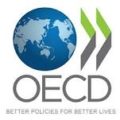Junior Environmental Economists/Policy Analysts
JOB DETAIL
The Organisation for Economic Co-operation and Development (OECD) is an international organisation comprised of 38 member countries, that works to build better policies for better lives. Our mission is to promote policies that will improve the economic and social well-being of people around the world. Together with governments, policy makers and citizens, we work on establishing evidence-based international standards, and finding solutions to a range of social, economic and environmental challenges. From improving economic performance and creating jobs to fostering strong education and fighting international tax evasion, we provide a unique forum and knowledge hub for data and analysis, exchange of experiences, best-practice sharing, and advice on public policies and international standard-setting.
The OECD Environment Directorate (ENV), in line with the strategic objectives of the Secretary‑General, provides relevant and timely information, analysis and advice to support governments in identifying and implementing the environmental policies needed to support a cleaner, more resource-efficient and low-carbon green growth path. The Directorate currently comprises approximately 175 staff members (economists, statisticians, scientists, engineers, administrative staff, consultants and trainees) working across a broad range of environmental issues such as: green growth, climate change, biodiversity, water, eco-innovation, circular economy, resource productivity and waste, environmental policy tools and evaluation, safety of chemicals, biotechnology and nanomaterials, and linkages between environment and tax, agriculture, transport, development assistance, trade and investment policies. For more information, please refer to www.oecd.org/env.
ENV is looking for several Junior Environmental Economists/Policy Analysts for the Environment and Economy Integration Division (EEI). EEI is currently undertaking work on interactions between trade and environment policy, circular economy and resource productivity, environment-economy modelling, environmental policies and economic outcomes, spatial planning, greening of mobility and transport, and on cost benefit analysis. The position will be to support the EEI team with empirical or modelling analysis on approaches to enhancing the environmental effectiveness and economic efficiency of policies in support of environmental objectives, to promote resource efficiency and the transition to a more circular economy. The successful candidate(s) will report to the Head of the EEI Division and/or one of the Team Leaders. .
Main Responsibilities
Research and drafting
- Undertake qualitative, empirical or modelling analysis on environmental and economic policy interactions in specific topics, such as on circular economy, valuation of adverse health impacts of environmental pollutants, environmental innovation, environmental justice, and trade and environmental policy.
- Draft reports, contribute to the implementation of projects and support the substantive organisation of technical meetings and workshops.
- Support the EEI division by providing drafts for briefing requests and other support requests from the OECD senior management.
- Contribute to the dissemination of findings, including through the preparation of presentation materials and through maintaining contacts with relevant government officials and other experts.
Liaison,meetings and communication
- Support the EEI team in the preparation of meetings and workshops where neededStay up to date of new research, exploratory work and polcies of relevance to ENV work, emanating from government, other international organisation, non-governmental organisation, academia and private sector more generally.
- Collaborate effectively with colleagues in the directorate, as required, to horizontal and multidisciplinary projects and other outputs of ENV and the OECD.
Ideal Candidate Profile
Academic Background
- An advanced post-graduate university degree (Ph.D. preferred) in environmental or resource economics, environmental sciences, or a related discipline. A strong quantitative background would be an asset.
Professional Background
- One to three years of experience in applied economics analysis with a demonstrated interest in policy-relevant research.
- Strong quantitative skills in data analysis.
- Demonstrated experience in economic analysis of policy instrument choice for addressing environmental concerns in key areas such as transport, land use, resource efficiency and technological innovation.
- Experience in substantively supporting the organisation of technical discussions and events.
- Proven ability to draft analytical and/or policy-relevant papers that are clear, concise, reader-friendly and tailored to the audience.
- Proven capacity to build and maintain relationships with stakeholders within and outside the Team to achieve key objectives.
Tools
- Excellent knowledge of common statistical and econometric packages (particularly Stata and R) and/or computable general equilibrium modelling tools (GAMS) would be an asset.
Languages
- Excellent communication skills, including the ability to explain technical economic issues and analysis in a manner understandable to experts and lay audiences alike.
- Fluency in one of the two official languages of the OECD (English and French) and a knowledge of, or willingness to learn, the other.
Core Competencies
- Please refer to the level 3 indicators of the OECD Core Competencies. For this role, the following competencies would be particularly important: Analytical thinking, Achievement focus, Drafting skills, Flexible thinking, Strategic thinking and Teamwork.
Contract Duration
- One year fixed term appointment, with the possibility of renewal.
- Monthly base salary starting from 5 221.54 EUR, plus allowances based on eligibility, exempt of French income tax.
- Click here to learn more about what we offer and why the OECD is a great place to work.
- Click here to browse our People Management Guidebook and learn more about all aspects relating to people at the OECD, our workplace environment and many other policies supporting staff in their daily life.
Please note that our Rules and Regulations stipulate that the mandatory retirement age is 65.
The OECD is an equal opportunity employer and welcomes the applications of all qualified candidates who are nationals of OECD member countries, irrespective of their racial or ethnic origin, opinions or beliefs, gender, sexual orientation, health or disabilities.
The OECD promotes an optimal use of resources in order to improve its efficiency and effectiveness. Staff members are encouraged to actively contribute to this goal.


